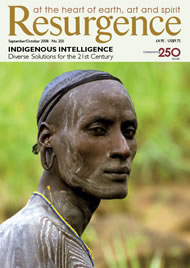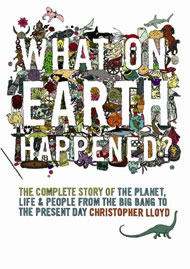HISTORY IS IN trouble. It has been splintered by experts into discrete topics and chopped up by governments to suit their educational fancies. Worse, it is almost never presented chronologically. How old is the universe? When did life on Earth begin? Who was humankind’s oldest ancestor? How did ancient Chinese science help shape the modern world? Why did democracy begin in Greece? Are humans really superior to other living things? Many people are understandably confused about the answers to such a broad but fundamental range of questions when all they learned at school was a few facts about kings and queens, a world war or two and maybe something about creatures called dinosaurs.
Actually, the problem is a lot deeper than that. Prospects for international peace and stability in a globalised world are largely in the hands of how history is taught. It is human society’s prime pump for manufacturing either mutual understanding or murderous mistrust.
I have spent the last two years wrestling with writing a narrative history of the world from the Big Bang to the present day. Whilst working on the project, I have become acutely aware of at least three major problems with traditional approaches to teaching and learning history, all of which must change if history is to become a positive force for peace.
The first concerns the role of the human species. According to the UK Department of Education’s Educational Standards website, the first unit of historical study for all children in Year 7 (aged 11–12) is to “Remind pupils that history is about people…”
This is wrong. History that is focused just on people reinforces historic notions of human supremacy. It is this perspective that underpins humanity’s recent relentless exploitation of the Earth’s capital resources, regardless of current costs or future consequences. Appreciate this: when the history of the Earth is seen on the scale of a 24-hour clock, the complete history of human civilisations has taken place in less than one second to midnight.
The second problem is to do with chronology. A recent report from the UK Qualifications and Curriculum Authority admits that history teaching for pupils aged between 11 and 16 should be reformed because “a lot of students emerge from their study of history without a sufficiently confident overview of the past; they are quite good at knowing certain topics in great depth, but not how all the bits fit together, making the programme of study feel disjointed.”
This is right. Learning topics in depth is useless unless students are sufficiently clear in their minds about the big themes of history, from a multi-disciplinary perspective – one that includes world religions, cultures, economics, philosophy and art as well as humankind’s historic relationship with Nature. Learning history in topics without an overarching chronological perspective is like being the proud owner of lots of clothes without having any hanging rails or shelf space in which to keep them. It’s a mess.
Broad chronologies have fallen out of fashion because big history conflicts with modern educational instincts that reduce all knowledge to meaningless bits. To counter this, history must be redefined as a broad embrace across all school subjects. In science, students should consider as a priority the huge contribution made by medieval Arab alchemists to modern medicine, while in maths students could focus on the enormous implications of Genoese trader Fibonacci’s book Liber Abaci on the development of numbers and arithmetic in the West.
The study of religion, art, evolution, technology, politics, economics, literature, music and horticulture are just as pertinent. In each case, history lies at the heart of such a curriculum by pumping information across disciplines so that students and teachers never stop asking the questions that really matter: How did we all get here? Where do we fit in? What is the best way forward for our modern, global, interconnected society based on a collective, shared understanding of past and present?
Broad chronologies also present problems for schools and governments because they often fly in the face of prejudice. It is commonly thought that history is usually written by its victors. Traditionally, this is so. But today’s historical documents are far more wide ranging – they are as much in our genetic code and in the diverse languages we speak as they are inscribed on the Rosetta Stone or written on a medieval king’s charter. With so much data, there is now no excuse or reason for history to be taught as propaganda to reinforce national pride.
But history today is as richly prejudiced as ever. Sixteenth-century sailor Sir Francis Drake is a national hero in Britain because he was the first Englishman to circumnavigate the globe. But in Spain he is still known as ‘El Draque’ (‘The Dragon’), the most feared of all the pirates of the Caribbean for his ruthless and merciless plunder.
In Turkey the Father of the Turks, Mustafa Kemal Atatürk, is a national hero for securing the country’s independence from the Imperialist powers in 1923. But in Greece, who lost out at the Treaty of Lausanne in 1923, schoolchildren are taught that Atatürk was a Muslim blackguard. In Armenia it is even worse: he is accused of being implicit in a genocide of at least 500,000 of their countrymen.
Just as destructive is what is not taught in history lessons. A superficial flick through the topics taught in UK schools for pupils aged 11–16 shows a certain acknowledgement for contemporary multiculturalism by including a section on medieval Islam and even a topic on slavery in America. But the vast majority of its topics are still concerned with the rise of the European West (the British Empire in particular), women gaining the vote and listing out reasons for the Holocaust.
There is no mention of the Opium Wars (1840s to 1860s), when the UK fought China because it refused to legalise the British smuggling of opium. Nor is there a whisper of the 19th-century scramble for Africa, when Western nations systematically stole the mineral and agricultural wealth of a whole continent and ruthlessly persecuted its people. Are today’s poppy fields in Bengal and the origins of Third World poverty somehow irrelevant to the study of history in British schools?
There is at least one sign of recent progress, though. In February 2008 Australian Prime Minister Kevin Rudd made a formal state apology to his country’s Indigenous people for the forced removal of more than 100,000 children from Aboriginal families between 1910 and 1970 (in contrast to UK Prime Minister Tony Blair, who still found it impossible to utter the word ‘apology’ on the occasion of the 200th anniversary of the British ban on slave trading in 2007). Rudd’s text is a moving testament to the power of history as a healer:
“The time has now come for the nation to turn a new page in Australia’s history by righting the wrongs of the past and so moving forward with confidence to the future. We apologise for the laws and policies of successive Parliaments and governments that have inflicted profound grief, suffering and loss on these our fellow Australians. We apologise especially for the removal of Aboriginal and Torres Strait Islander children from their families, their communities and their country. For the pain, suffering and hurt of these Stolen Generations, their descendants and for their families left behind, we say sorry. To the mothers and the fathers, the brothers and the sisters, for the breaking up of families and communities, we say sorry. And for the indignity and degradation thus inflicted on a proud people and a proud culture, we say sorry. We the Parliament of Australia respectfully request that this apology be received in the spirit in which it is offered as part of the healing of thenation.”
For humanity to have the slightest chance of collaborating to combat the combined challenges of population growth, globalisation and climate change, it needs fresh approaches to history such as this.
Our first priority should be to promote cultural diversity and a global perspective so as to avoid the temptations of nationalistic pride and propaganda. Second, students should be given a clear, multi-disciplinary, chronological framework of what happened where and when so that later specialisation becomes embedded in context, not cast off in isolation. Finally, the history of human civilisations should be reconnected with the much older saga of planet, life and people. Only then can humankind’s impact on the world be properly assessed, and constantly re-assessed, as part of an interconnected whole.
See www.whatonearthhappened.com for more information.








